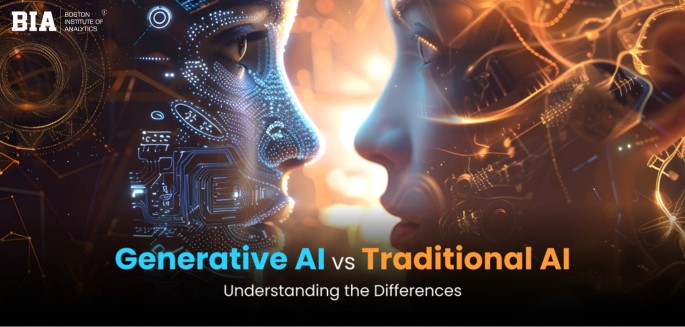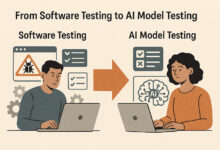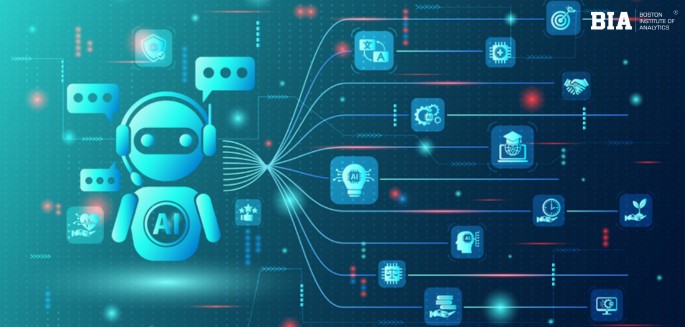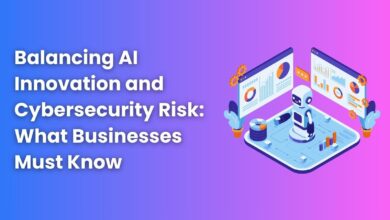The Role of Agentic AI in Automating Complex Business Workflows
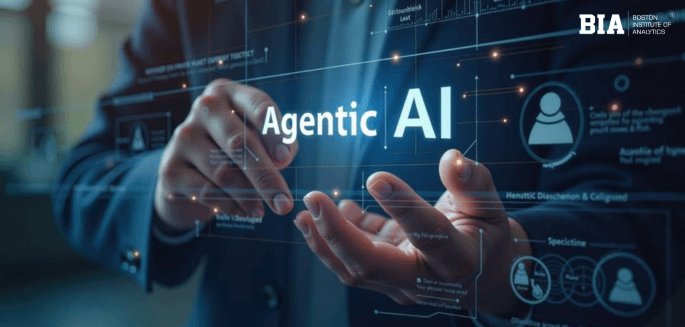
Agentic AI goes beyond conventional automation by mimicking human agency, making autonomous decisions, and reacting to unexpected circumstances, as well as coordinating between interdependent systems. In this blog, we discover the ground-breaking role of Agentic AI in automating complex business processes, how it is transforming industries, and why upskilling with an Agentic AI course is crucial for professionals and organizations seeking to stay ahead.
In today’s rapid-paced, constantly evolving digital economy, businesses are under constant pressure to enhance business effectiveness, reduce expenses, and deliver quicker, intelligence-infused services. Much of the back-office work already has been automated—but as procedures become more complex and dynamic, outdated automation systems no longer can keep up. That is where Agentic AI enters the picture as a game-changer.
What Is Agentic AI?
Agentic AI, or Agent-Based Artificial Intelligence, is intelligent systems capable of independent operation with goal-oriented behaviour, decision-making abilities, and the capacity to initiate in dynamic environments. In contrast to classical AI systems that are highly dependent on prewritten programs, agentic AI models tend to emulate intelligent agents—they sense their world, reason about it, make decisions, and act to accomplish particular goals.
Understanding the “Agent” in Agentic AI
At the heart of Agentic AI is the notion of the “agent.” An agent is an entity which has the ability to perceive its surroundings and act upon them in order to achieve goals. Agents can operate independently or in teams (multi-agent systems), typically cooperating or bargaining with one another. For example, in a delivery system, a system of multiple delivery drones might be intelligent agents that each plan routes and communicate to prevent duplication.
These AI agents are made adaptive and proactive. They don’t wait for every instruction; they interpret context, project outcomes, and act autonomously. This attribute is needed in constantly changing environments such as autonomous cars, smart cities, or real-time strategy games.
How Agentic AI Differens from Traditional AI?
Conventional AI systems usually take a reactive or scripted path. They are based on explicit input-output mappings and are tuned for specific tasks, like face recognition, language translation, or text generation. Agentic AI, on the other hand, is goal-directed and can plan, learn from feedback, and change strategies over time. It’s not merely about performing a task—it’s about determining what task to perform next and how to perform it, with little human intervention.
This renders agentic AI particularly effective in intricate, real-world use cases where rules can shift or are not yet fully understood. Imagine a personal AI assistant not only booking your appointments but also actively resolves disputes, anticipates your tastes, and bargains with other systems on your behalf.
Applications and Future Impact
Agentic AI is being used more and more in autonomous robots, financial trading platforms, healthcare diagnosis, supply chain automation, and interactive virtual assistants. With the development of Large Language Models such as GPT-4, agentic AI can now blend reasoning with natural language ability, developing agents that can talk, learn, and behave more naturally.
Why Traditional Automation Falls Short?
Although robotic process automation (RPA) and workflow engines have considerably enhanced operational efficiency, they work based on static rules and scripts. They work amazingly well for structured, routine tasks but fail when:
- Conditions change unpredictably
- Tasks require contextual understanding
- Multiple systems must be coordinated
- Decisions involve trade-offs or prioritization
For example, in customer support, an RPA tool can automatically reply to questions based on keywords. But if a customer problem touches billing, technical support, and legal aspects, a rule-based system cannot close the case. Human agents come in—not because the task is by definition human, but because legacy tools lack flexibility.
This is precisely where Agentic AI in automating complex workflows delivers exponential value.
Agentic AI in Automating Complex Business Workflows
In the modern fast-moving digital economy, there is an incessant imperative on organizations to optimize processes, reduce costs, and make more agile, more timely decisions. And here enters Agentic AI—AI with independent operation capability to make decisions in direction of specific goals. Agentic AI redefines business processes from a reactive model into intelligent, forward-thinking models using automated advanced workflows.
Beyond Rule-Based Automation
Traditional automation tools like Robotic Process Automation (RPA) operate by following hardcoded rules and scripts. They are suitable for repetitive tasks but cannot perform dynamic, high-level decision-making. Agentic AI, on the other hand, can understand context, weigh various options, and make decisions autonomously in multi-step processes. This enables processes to be automated that previously were considered to be too complex for traditional automation.
For example, in a customer care process, Agentic AI can analyze incoming support tickets, route them based on priority, reply with intelligent replies, escalate if necessary, and learn from each interaction to maximize future success. It is far more than keyword detection—it observes the context and replies with intent.
Orchestrating Multi-Agent Collaboration
Workflows in most business environments cross functions, tools, and platforms. Agentic AI agents can be designed to act alone but also together as an ensemble of domain-specific agents. For instance, for a sales pipeline, a lead qualifying AI agent, a follow-up via email or chat AI agent, and an analyzing feedback and optimizing the message strategy AI agent are all possible.
These agents not only work together but can also negotiate, delegate tasks, or escalate decisions whenever unexpected variables enter the scene. Intelligent agent orchestration facilitates cross-functional collaboration easier in processes involving finance, HR, supply chain, and IT.
Adapting to Business Goals in Real Time
What distinguishes Agentic AI is its ability to coordinate action with changing business goals. If a business adjusts the top priority from saving costs to keeping customers—Agentic AI agents can reschedule tasks, re-optimize communication strategies, and redistribute resources without needing human intervention at every point. This level of responsiveness makes them ideal for dynamic business environments like e-commerce, SaaS, logistics, and marketing.
The Growing Need for Agentic AI Skills
As AI systems mature, the emergence of Agentic AI—AI with the ability to set goals independently, reason, and act—is transforming the job market globally. As opposed to conventional AI, which executes commands given to it, agentic AI acts with an agency, making autonomous decisions, responding to context, and handling intricate tasks without continuous human intervention. Such a change has brought forth challenges demanding more professionals who have the expertise, experience, and knowledge to design, operate, and optimize such intelligent agents.
Why Agentic AI Demands a New Skill Set?
Conventional AI competencies usually centre on machine learning, data science, and model training. Although these are still important, interacting with agentic AI adds more complexity layers. Experts must now learn about multi-agent systems, decision theory, systems engineering, and autonomous workflow orchestration. Competencies like prompt engineering, reinforcement learning, and ethical AI design are equally important as coding and data science.
In addition, building agentic systems needs a mind-set that combines technical expertise with strategic thinking. It’s not merely about creating clever tools—it’s about creating AI agents that can think, act, and cooperate towards business or societal objectives. This change demands expertise in systems thinking, real-world simulation environments, and human-AI interaction.
High-Demand Roles in the Agentic AI Era
The need for talent is increasing in positions such as AI Solutions Architect, Agent Designer, Prompt Engineer, Autonomous Systems Engineer, and AI Workflow Strategist. These positions include designing smart agents that engage with users, become part of enterprise software, and make decisions in real time. Companies in industries ranging from finance and healthcare to logistics and marketing are hiring experts who can collaborate with or build autonomous agents to fuel innovation and efficiency.
In addition, trainers, teachers, and curriculum designers are similarly in demand to train the future workforce in the field of agentic AI. Organizations that provide upskilling courses in these subjects are placing students at the vanguard of employment fit for the future.
Empowering the Workforce of the Future
As companies increasingly implement intelligent agents to automate functions, the workforce is also changing. Whether you are a developer, analyst, marketer, or manager, learning about how agentic AI functions—and how it applies within your field—will be soon become unavoidable. Education institutions and training organizations are now in a rush to provide hands-on, industry-relevant courses to fulfil this gap.
What to Expect from a Quality Agentic AI Course?
As Agentic AI expands at breakneck speed, business and technology experts are eager to develop the skills needed to tap into its full potential. But not every AI course is created equal. An effective Agentic AI course should be a well-rounded, hands-on learning experience that covers both the theoretical foundations and practical applications of autonomous AI systems. Here’s what you can expect from the best course.
In-Depth Coverage of Core Concepts
A solid course should start with a strong understanding of the fundamentals of Agentic AI. This includes a review of smart agents, multi-agent systems, autonomous decision-making, and what separates traditional AI and agent-based models of AI. Prepare to examine topics like reinforcement learning, decision theory, and agent architecture—all essential to understanding the way these systems think, act, and collaborate within dynamic environments.
Hands-On Experience with Real-World Applications
Theory is not enough in the case of Agentic AI. An excellent course has to involve applied projects, wherein you get to create, train, and integrate autonomous AI agents into actual contexts. You might be engaged with autonomous robots, process automation by AI, or dynamic decision-making in complex business workflows. Real-world exposure, in addition to cementing principles, equips students for professional applications in applying these in real-world employment contexts.
Focus on Multi-Agent Collaboration
Because Agentic AI systems are usually collaborative or competitive multi-agent systems, you ought to learn in a good course how to develop and orchestrate multi-agent systems. You’ll learn how to oversee the coordination, negotiation, and communication among the agents, and how to have them come together for a joint goal or achieve individual goals without sabotaging one another. These are valuable skills to acquire for developing intricate AI environments in fields like finance, medicine, and transportation.
Ethical Considerations and Future Impact
As with all of the cutting-edge AI technology, there are problems of ethics. A top-grade Agentic AI course will address the types of questions like safety, bias reduction, and ethical consequences of independent decision-making. You’ll see the far-reaching social effects of Agentic AI so you can create responsible, fair, and open systems.
Comprehensive Support and Career Guidance
A great Agentic AI course doesn’t just teach—it helps students succeed professionally. Expect strong mentorship, peer collaboration, and access to career support. Many quality courses also provide opportunities for networking, internships, or industry partnerships, ensuring you’re well-equipped for a future in Agentic AI.
Final Thoughts: Empowering Innovation with the Right Training
Agentic AI in automation is a power to be reckoned with, one that can literally redefine the way companies do business at every level. By introducing intelligent, self-guided agents into the workflow, companies can achieve previously unimaginable levels of agility, resilience, and productivity.
But this transformation requires skill—professionals who are not only familiar with AI theory but how to apply it in the real world.
If you want to be an expert in these competencies, study a course integrating academics with business relevance. The best institution doing this future-proofing training for Agentic AI and intelligent automation is a highly reputed analytics and AI training academy with strong footprint in capitals like London, Bengaluru, Mumbai, and many more.
Their Agentic AI program, crafted by industry experts, provides the practical expertise and strategic thinking necessary to thrive in this evolving space. From hands-on projects to personalized mentorship, the curriculum is tailored for those who want to define the future of AI-powered automation.
In a future where smart agents are the foundation of online enterprises, the moment is now to make your move. Equip yourself with skills that will make a difference, and be among the next wave of innovation powered by Agentic AI.
